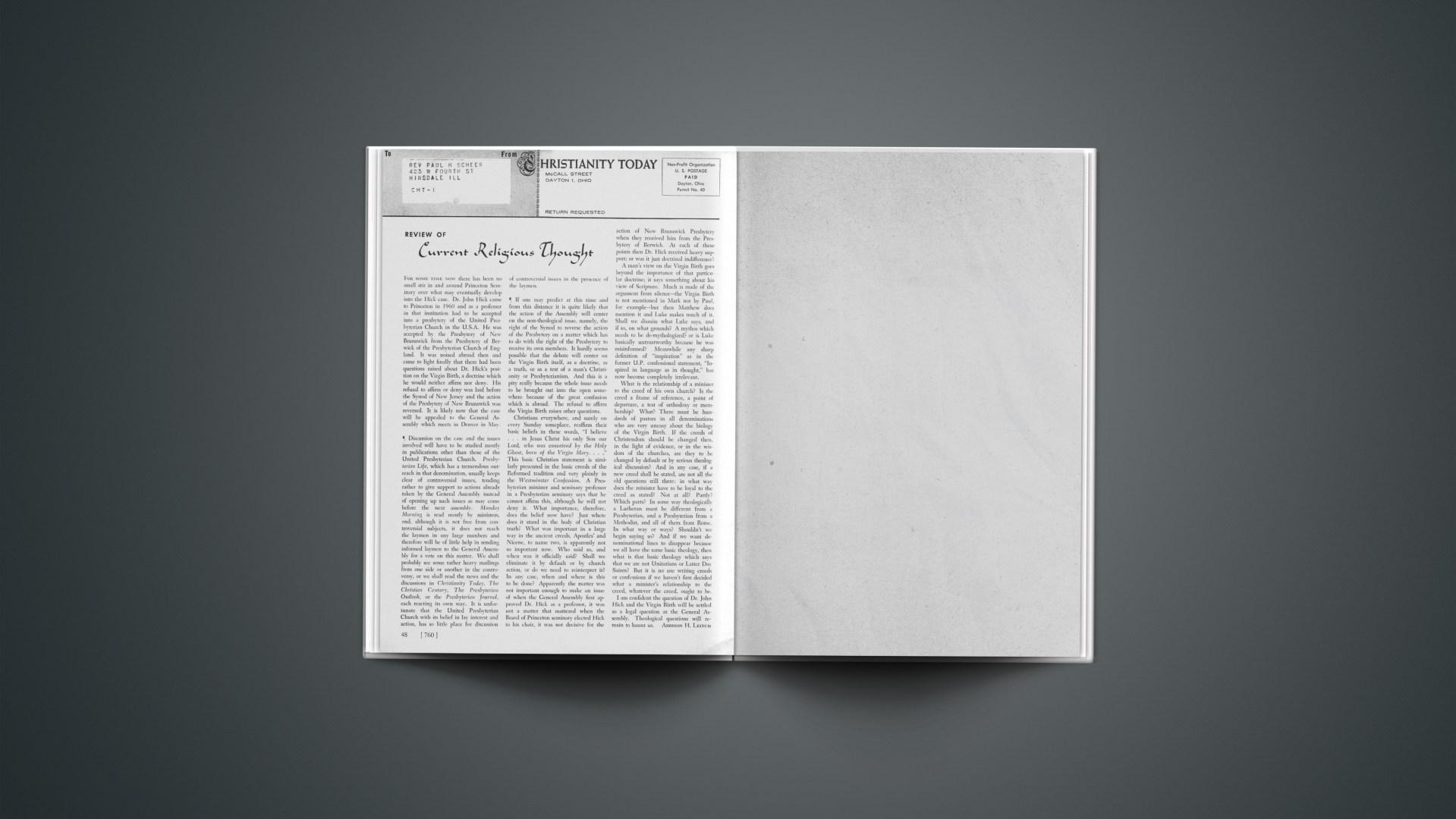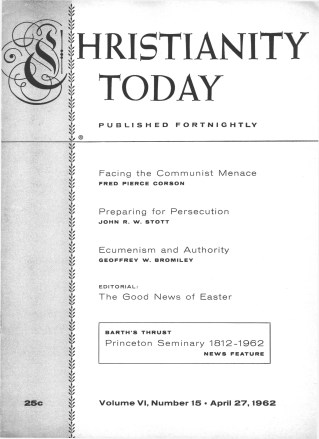For some time nowthere has been no small stir in and around Princeton Seminary over what may eventually develop into the Hick case. Dr. John Hick came to Princeton in 1960 and as a professor in that institution had to be accepted into a presbytery of the United Presbyterian Church in the U.S.A. He was accepted by the Presbytery of New Brunswick from the Presbytery of Berwick of the Presbyterian Church of England. It was noised abroad then and came to light finally that there had been questions raised about Dr. Hick’s position on the Virgin Birth, a doctrine which he would neither affirm nor deny. His refusal to affirm or deny was laid before the Synod of New Jersey and the action of the Presbytery of New Brunswick was reversed. It is likely now that the case will be appealed to the General Assembly which meets in Denver in May.
Discussion on the case and the issues involved will have to be studied mostly in publications other than those of the United Presbyterian Church. Presbyterian Life, which has a tremendous outreach in that denomination, usually keeps clear of controversial issues, tending rather to give support to actions already taken by the General Assembly instead of opening up such issues as may come before the next assembly. Monday Morning is read mostly by ministers, and, although it is not free from controversial subjects, it does not reach the laymen in any large numbers and therefore will be of little help in sending informed laymen to the General Assembly for a vote on this matter. We shall probably see some rather heavy mailings from one side or another in the controversy, or we shall read the news and the discussions in Christianity Today, The Christian Century, The Presbyterian Outlook, or the Presbyterian Journal, each reacting its own way. It is unfortunate that the United Presbyterian Church with its belief in lay interest and action, has so little place for discussion of controversial issues in the presence of the laymen.
If one may predict at this time and from this distance it is quite likely that the action of the Assembly will center on the non-theological issue, namely, the right of the Synod to reverse the action of the Presbytery on a matter which has to do with the right of the Presbytery to receive its own members. It hardly seems possible that the debate will center on the Virgin Birth itself, as a doctrine, as a truth, or as a test of a man’s Christianity or Presbyterianism. And this is a pity really because the whole issue needs to be brought out into the open somewhere because of the great confusion which is abroad. The refusal to affirm the Virgin Birth raises other questions.
Christians everywhere, and surely on every Sunday someplace, reaffirm their basic beliefs in these words, “I believe … in Jesus Christ his only Son our Lord, who was conceived by the Holy Ghost, born of the Virgin Mary …” This basic Christian statement is similarly presented in the basic creeds of the Reformed tradition and very plainly in the Westminster Confession. A Presbyterian minister and seminary professor in a Presbyterian seminary says that he cannot affirm this, although he will not deny it. What importance, therefore, does the belief now have? Just where does it stand in the body of Christian truth? What was important in a large way in the ancient creeds, Apostles’ and Nicene, to name two, is apparently not so important now. Who said so, and when was it officially said? Shall we eliminate it by default or by church action, or do we need to reinterpret it? In any case, when and where is this to be done? Apparently the matter was not important enough to make an issue of when the General Assembly first approved Dr. Hick as a professor, it was not a matter that mattered when the Board of Princeton seminary elected Flick to his chair, it was not decisive for the action of New Brunswick Presbytery when they received him from the Presbytery of Berwick. At each of these points then Dr. Hick received heavy support; or was it just doctrinal indifference?
A man’s view on the Virgin Birth goes beyond the importance of that particular doctrine; it says something about his view of Scripture. Much is made of the argument from silence—the Virgin Birth is not mentioned in Mark nor by Paul, for example—but then Matthew does mention it and Luke makes much of it. Shall we dismiss what Luke says, and if so, on what grounds? A mythos which needs to be de-mythologized? or is Luke basically untrustworthy because he was misinformed? Meanwhile any sharp definition of “inspiration” as in the former U.P. confessional statement, “Inspired in language as in thought,” has now become completely irrelevant.
What is the relationship of a minister to the creed of his own church? Is the creed a frame of reference, a point of departure, a test of orthodoxy or membership? What? There must be hundreds of pastors in all denominations who are very uneasy about the biology of the Virgin Birth. If the creeds of Christendom should be changed then, in the light of evidence, or in the wisdom of the churches, are they to be changed by default or by serious theological discussion? And in any case, if a new creed shall be stated, are not all the old questions still there: in what way does the minister have to be loyal to the creed as stated? Not at all? Partly? Which parts? In some way theologically a Lutheran must be different from a Presbyterian, and a Presbyterian from a Methodist, and all of them from Rome. In what way or ways? Shouldn’t we begin saying so? And if we want denominational lines to disappear because we all have the same basic theology, then what is that basic theology which says that we are not Unitarians or Latter Day Saints? But it is no use writing creeds or confessions if we haven’t first decided what a minister’s relationship to the creed, whatever the creed, ought to be.
I am confident the question of Dr. John Hick and the Virgin Birth will be settled as a legal question at the General Assembly. Theological questions will remain to haunt us.










